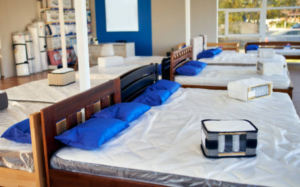Sleep Troubles for Low income
Sleep difficulties, significantly impacting overall well-being, are usually more acute among low-income individuals due to unique challenges. Factors like overcrowded or noisy living environments, inadequate bedding, poor ventilation, and inconsistent temperatures contribute to poor sleep quality. One effective solution to this is programs offering free mattresses for low-income families, which can significantly improve sleeping conditions. This can result in disrupted sleep patterns and insomnia, exacerbating the challenges faced by those with financial constraints. This article delves into these issues and discusses strategies and community resources, including mattress programs, to improve sleep quality for those affected by economic difficulties.
Factors Contributing to Sleep Troubles for Low-Income Individuals
Sleep troubles for low-income individuals are constantly exacerbated by a multitude of external factors, making it even harder for them to get a good night’s sleep. One of the main factors is the lack of suitable housing. Many low-income individuals live in overcrowded or substandard housing conditions, which can lead to increased noise levels, poor ventilation, and uncomfortable sleeping arrangements. These factors can make it difficult for individuals to relax and fall asleep, resulting in fragmented and restless sleep patterns.

Another contributing factor is the high levels of stress and anxiety that low-income individuals usually face. Financial insecurity, limited access to healthcare, and the constant struggle to make ends meet can take a toll on their mental well-being. Chronic stress and worry can cause sleep disturbances, such as insomnia or nightmares. The lack of access to affordable healthcare means that many low-income individuals do not receive proper treatment for sleep disorders or underlying medical conditions that could be affecting their sleep.
Sleep troubles for low-income individuals are influenced by various external factors that make it challenging for them to achieve restful sleep. The lack of suitable housing and the high levels of stress and anxiety contribute to the disruption of their sleep patterns. Addressing these factors and providing better housing options and support for mental health could significantly improve the sleep quality and overall well-being of low-income individuals.
The Impact of Inadequate Sleeping Conditions on Sleep Quality
Restless nights in less-than-ideal living conditions can leave you feeling drained and frustrated, struggling to find solace in your own bed. For low-income individuals, inadequate sleeping conditions can significantly impact their sleep quality and overall well-being. The lack of a comfortable mattress, proper bedding, and a quiet sleeping environment can all contribute to disrupted sleep patterns and restless nights.
One of the most significant impacts of inadequate sleeping conditions is the physical discomfort it causes. Low-income individuals usually cannot afford a high-quality mattress or bedding, leading to body aches and pains. Sleeping on a worn-out or uncomfortable bed can result in backaches, stiffness, and even joint pain, making it difficult to fall asleep and stay asleep throughout the night. The lack of proper bedding, such as pillows and blankets, can exacerbate discomfort and lead to restless sleep.
Moreover, the noise and disturbances in low-income living environments can significantly affect sleep quality. Many low-income individuals live in crowded or noisy neighborhoods, where loud neighbors, traffic, or other external factors can disrupt their sleep. The inability to find a quiet and peaceful sleeping environment can lead to frequent awakenings and difficulty falling asleep. The constant noise exposure can also contribute to increased stress and anxiety, further impacting sleep quality. Overall, the impact of inadequate sleeping conditions on sleep quality for low-income individuals profoundly highlights the need for access to better living conditions to promote better sleep and overall well-being.
Financial Constraints and Sleep Quality
When facing financial constraints, it can be challenging to prioritize investing in a comfortable sleeping environment, impacting your sleep quality. Low-income individuals frequently have to make difficult choices when allocating their limited resources. How to fold an air mattress properly can be a practical solution for maximizing space and maintaining sleep hygiene, especially in smaller living quarters.

Unfortunately, creating a conducive sleep environment is continually not a top priority. This can result in sleeping on old or uncomfortable mattresses, using worn-out pillows, or even sharing a bed with multiple family members. The lack of proper bedding management, including the inability to fold and store items like air mattresses correctly, contributes to these suboptimal sleeping conditions. This constantly leads to various sleep troubles, including difficulty falling asleep, frequent awakenings at night, and poor sleep quality.
Financial constraints can also prevent low-income individuals from addressing underlying sleep disorders or seeking professional help for their sleep troubles. Sleep disorders such as sleep apnea or insomnia require proper medical diagnosis and treatment, but the cost of consultations, tests, and medications can be prohibitive for those living on a tight budget. As a result, individuals continue to suffer from untreated sleep disorders, further exacerbating their sleep problems and impacting their overall well-being.
Financial constraints can significantly impact sleep quality for low-income individuals. The inability to invest in a comfortable sleeping environment and address underlying sleep disorders can lead to a cycle of poor sleep, which can have detrimental effects on physical and mental health. Society must address these inequalities and provide support and resources to ensure that everyone, regardless of income, has access to adequate sleep conditions and necessary medical care for sleep disorders.
Strategies to Improve Sleep for Low-Income Individuals
If you’re on a tight budget, there are practical strategies you can try to improve your sleep quality. One of the first things you can do is establish a consistent sleep schedule. Going to bed and waking up at the same time every day, even on weekends, can help regulate your body’s internal clock and improve the quality of your sleep.
Creating a relaxing bedtime routine can signal your body that it’s time to wind down and prepare for sleep. This can include reading a book, taking a warm bath, or practicing relaxation techniques like deep breathing or meditation. By incorporating these strategies into your routine, you can create a more conducive environment for sleep and improve your overall sleep quality.
Another strategy to consider is optimizing your sleep environment. Ensuring your bedroom is dark, quiet, and calm can help promote better sleep. Investing in blackout curtains, earplugs, or a white noise machine can help block out any external disturbances that disrupt sleep. Ensuring your mattress and pillows are comfortable and supportive can significantly affect your sleep quality.
While purchasing a new mattress not be financially feasible for everyone, affordable options, such as mattress toppers or pillows, can provide added comfort. Lastly, limit your exposure to electronic devices, especially before bedtime. The blue light emitted by screens can interfere with your body’s natural sleep-wake cycle, making it harder to fall asleep. Instead, consider engaging in activities that promote relaxation and reduce screen time in the evening.
Community Resources and Support for Better Sleep
Are you looking to improve your sleep? Along with checking out the community resources and support available to help you get a better night’s rest, researching mattress brands can be a significant step. Low-income individuals usually face unique challenges when getting quality sleep, but organizations and programs can assist.

Local community centers offer workshops or classes on sleep hygiene and relaxation techniques, which can be complemented by knowledge on choosing the right mattress. These centers provide access to affordable or accessible exercise programs, as regular physical activity can promote better sleep.
In these community centers, you find resources or recommendations for researching and selecting affordable mattress options. They usually have support groups where individuals experiencing similar sleep troubles can connect with others, offering a sense of understanding and camaraderie and possibly sharing tips on finding the right sleep products.
Another valuable resource for low-income individuals seeking better sleep is local health clinics. Many clinics offer sleep assessments and consultations with healthcare professionals who can guide them on improving sleep habits. They know about low-cost or free sleep aids, such as sleep masks or earplugs.
Clinics partner with sleep clinics or sleep disorder specialists who can provide further evaluation and treatment options if necessary. By reaching out to these community resources and support systems, low-income individuals can access the tools and knowledge they need to improve their sleep and overall well-being.
Conclusion
In conclusion, low-income individuals usually struggle with sleep troubles due to factors like noise, overcrowded environments, and limited access to resources like quality bedding. Financial constraints further exacerbate these issues, hindering the ability to create a conducive sleep environment. There are ways to improve this situation. Community resources like affordable housing, sleep education programs, and personal strategies like relaxation techniques and consistent sleep routines can enhance sleep quality. Addressing these issues and providing support is critical to alleviating sleep difficulties and promoting better well-being for those facing economic challenges.



